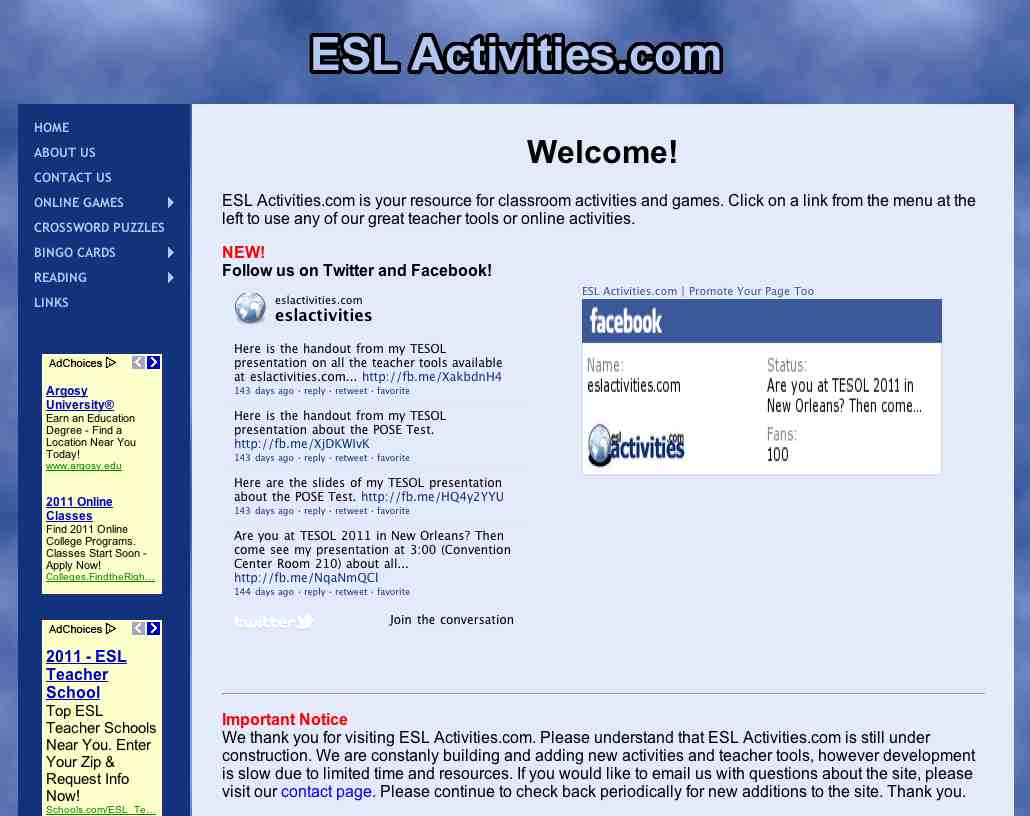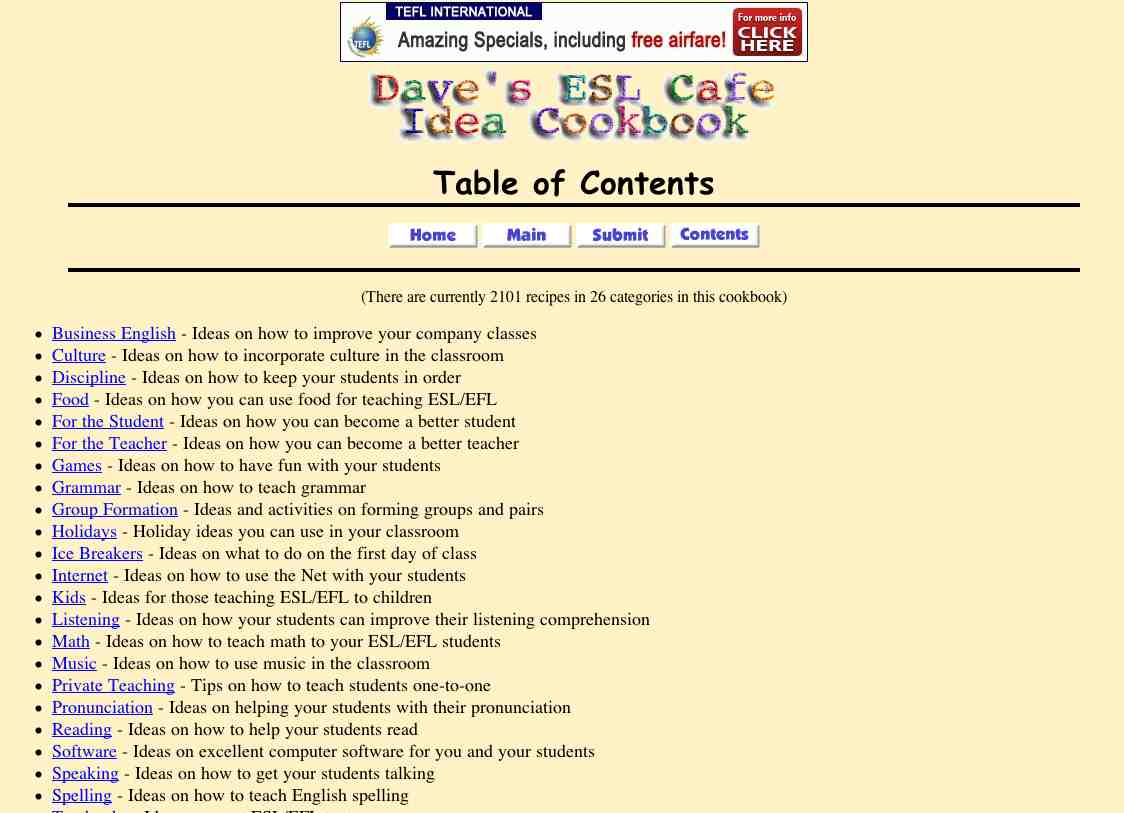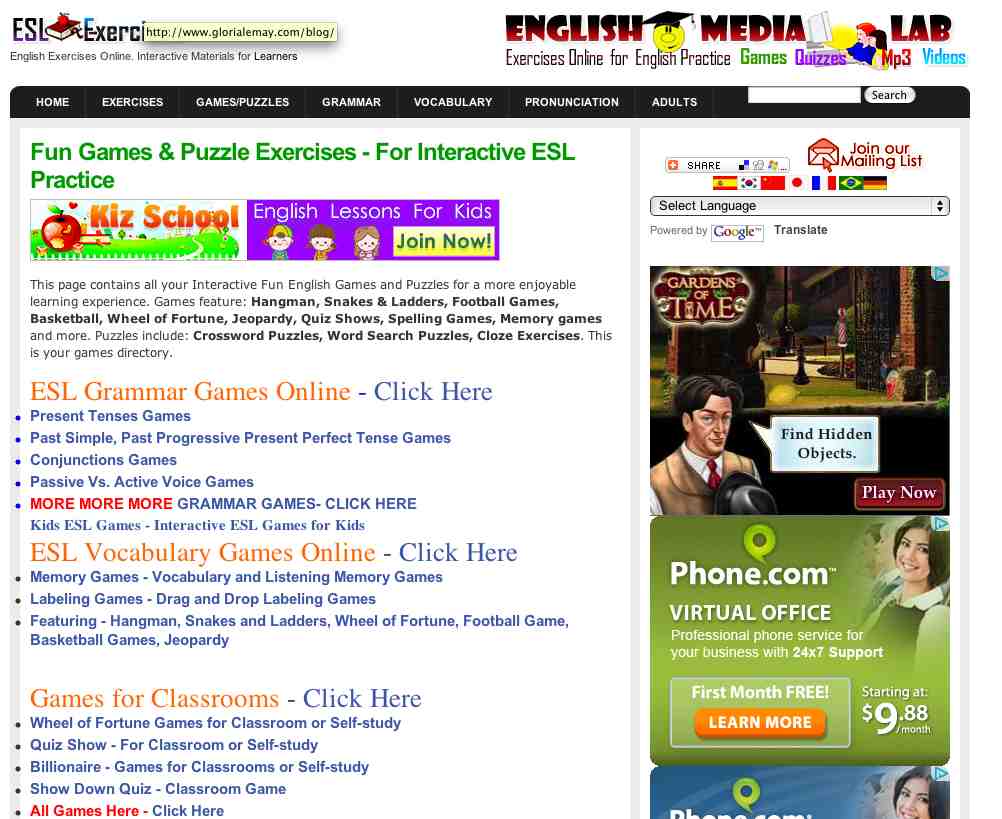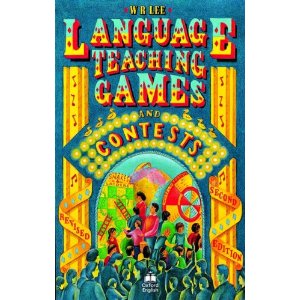Introduction
Games involve challenges, and educational researchers point out that the most effective learning takes place when challenges are involved. Games also help learners to keep their interest in learning.
In brief, using games can create a productive and enjoyable learning environment if you use them properly.
Scenario: Using games to help students remember vocabulary
Hannah applied for an EFL job in Mexico and got accepted to work at a small language school. She did not have much experience in teaching English so she decided to follow the textbook as much as possible. She was assigned to teach a reading class which required students to memorize a vast amount of vocabulary. Two weeks later, students were complaining about how difficult it was for them to memorize many words and to recall the already learned words later. The students asked Hannah if she could come up with a better and creative way of teaching vocaublary.
When Hannah asked other experienced teachers for help, they all said the same thing: “Use some fun games to review vocabulary at the end of every lesson.” Experienced teachers suggested that playing games is an excellent way to help students naturally use words repetitively. They also told her that this sort of repetition helps students to remember the learned words longer.
Hannah started thinking about what kinds of games and activities she could use in her English lessons and how she could use them to review vocabulary. She also worried, however, that she might look unprofessional using games in her teaching.
Reflection questions
 What would you do if you had students complaining about having to memorize too much vocabulary and it was overwhelming for them to remember all the words they have previously learned?
Which types of games might you use when you teach English?
Where could you find them?
What characteristics would you look for when selecting games for language teaching?
How should you use games in your language classes without looking unprofessional?
What would you do if you had students complaining about having to memorize too much vocabulary and it was overwhelming for them to remember all the words they have previously learned?
Which types of games might you use when you teach English?
Where could you find them?
What characteristics would you look for when selecting games for language teaching?
How should you use games in your language classes without looking unprofessional?
Objectives of this unit
After you work through this unit, you will be able to…
- Explain the benefits of using games for language teaching
- Use games to make your lessons more creative and motivating.
- Choose games that are appropriate for your students.
- Play those games effectively in your language classes.
The least you should know
Games can be great tools for teaching almost every aspect of language, but especially good for reviewing the lesson and help students recall what they have learned such as vocabulary and grammar rules. They can be used for practicing all the skills (all of the English language elements) and at all stages of teaching and learning English language. Games can provide both rehearsed and extemporaneous, language practice. Either way, they can be productive and enjoyable if done right.
You should always have a clear instructional purpose in using games, and if your students are adults, you may also need to explain it to them. Games must be an integrated part of an entire lesson, not just a playful, unconnected activity that makes you appear unprepared or unprofessional.
This unit will cover four major topics related to the use of games and effective activities for language teaching: The benefits of games in language learning, ways of using games, criteria for selecting appropriate songs for language teaching, and types of games for different skill areas.
Benefits of using games
Games can produce many benefits in your language class.
- Learners can practice and internalize vocabulary, speaking, and many other English language skills through playing games.
- Motivation can also be increased by using games and competition.
- In many games learner’s attention is focused on the message, thus they acquire language forms unconsciously. Games can be presented with relatively little preparation and can be used for the review and practice of various language points.
Ways of teaching games
When using games to teach English, you need to:
- Help students get familiar with new games by introducing them in the following ways:
- explaining linguistic concepts to the class
- demonstrating the game’s procedures first by teacher modeling and then by student modeling (use one or two learners)
- writing key language and instructions on the board
- Decide which form of class organization is best suited for playing the selected game: pair work, group work, individual, the whole class
- Make sure each group or individual is doing what you expect them to be doing during the game by going from group to group or individual to individual listening in, and making comments and corrections, if appropriate.
- Relate the language principle from the game to the larger lesson and/or course curriculum.
Selecting games for language teaching
For successful language teaching, choose games that:
- are most suited to your students' linguistic and maturity leve, and purpose of their learning
- match their purposes for using English and the context in which they will use it
- promote students to talk more freely while they play
Be creative and make your own games by studying magazines, newspapers, radio and TV programs and by asking your learners and searching online (e.g. www.tesolzone.com, for more see the list at the end of this unit.)
Collect and file games for use whenever you happen to come across them. If you don’t, you may not be able to find them later when you need them.
Have students create their own games in a group and use them as a review. This is a great way for students to review the concepts they learned by creating and including what they have learned in their games.
Types of games
Here are some examples of games that have been used successfully for English teaching. For more examples or ideas, see the “Where to go to learn more” section at the end of this unit.
Number games
- Bingo: Almost everyone knows how to play Bingo, so no explanation is needed except for how to make the cards: The teacher draws a sample (5x5) grid on the board and students copy it on their papers. Then they fill in their own numbers (or words) randomly so that every student has a different card.
- Count even/odd numbers: The teacher says the first number which is either an even or odd number and the students one by one are responsible to say the next even or odd numbers that go after the number stated by the teacher. (e.g.Teacher: 11! Students: 11, 13, 15, 17, 19, 21… Teacher: 20! Students: 20, 22, 24, 26….)
Vocabulary games
- Word building: The teacher gives one word and the students need to say any words that are related to the word given by the teacher. (e.g. Teacher: tree! Student 1: pencil, Student 2: desk, Student 3: wood, Student 4: branch…)
- My shopping basket: Student 1: In my basket I’ve got an apple. Student 2: In my basket I’ve got an apple and a ball. Student 3: In my basket I’ve got an apple and a ball and a sock.
- Letter chains: through-here-egg-gap-photograph- hair, etc.(First letter of the next word must match the last letter of the previous word.)
Games for reviewing vocabulary words
- Who am I?: Students have a job title or names of objects (e.g. fruits, vegetables, furniture, etc.) on their forehead or back and they are supposed to ask their classmates Yes or No questions to find out what kind of job they have.
- Speed quiz: Divide the class into two groups. Give each team a stack of cards with vocabulary they learned in class and have them explain those words to their team members, (without actually saying the words) within given time limits. The team that gets more words within the time wins.
Games for speaking practice with questions
- Don’t say No: Explain that each student must try to make his partner say No by coming up with all kinds of Yes or No questions. Have them keep a tally of the number of times No is said by the partner and switch turns. The student with the lowest score wins. (e.g. Do you like to study? )
A useful game for Listening - Gossip: The teacher holds a card that has a list of sentences. Students line up in two or more rows. The teacher whispers a sentence to the first person and then the student whispers it to the next in line, and so on until everyone has heard the sentence. The last student from each line to hear the message should say it out loud or write it on the board. The teacher writes down the original sentence on the board. The team which has the most accurate sentence in the end wins.
A useful game for Writing- Story build-up: Divide the class into two groups. Have each student to write one sentence on a piece of paper and pass it down to the next person who should write one sentence after the previous sentence. The next students continue in the same fashion. Each team is trying to build up a continuous story. The team whose group members are all done writing the sentences first wins this game. Then one student from each team reads the team’s story to the class.
WARNING
Games must be an integrated part of an entire lesson, not just a playful, unconnected activity that makes you appear unprepared or unprofessional. Also the use of games needs to have a clear instructional purpose. Plan to use games in your lessons ahead of time and use them to facilitate your teaching.
Some games are not helpful for language learning or are not practical for classroom use.
Be careful with…
- Games like chess that require minimal language use
- Elimination games (e.g., traditional “Simon Says”) in which those who need practice the most get eliminated earliest
- Complicated, time-consuming games with elaborate set-up/take-down/scorekeeping procedures (e.g., Monopoly).
- Overly childish games (e.g., London Bridge) especially with young adult and older learners.
Video Examples
Suitcase game: Here is a video clip that shows two teachers in Thailand using a game with young English language learners. This game uses clothing in a suitcase to review and practice clothing vocabulary the students learned previously. The students are excited and motivated to learn or review vocabulary by playing this fun game.
Click here. 
Comprehension and reflection questions
Think about each of the following questions related to the video you just watched. Write a sentence or two in response to each one.

Was there anything that the teacher did well or poorly? Why do you think so?
How did the teacher correct the students’ errors?
Compare the teacher’s and students’ actions to what you read in the “The Least You Should Know” section above.
How do these teachers’ and students’ use of games compare to your own teaching or learning experiences?
Where to go to learn more
If you want to know more about using games for language teaching, you can refer to these additional resources.
Connections to other units in this program
Unit 2C: Designing effective lessons for language learning and teaching
Unit 8A: Conducting effective and enjoyable conversation classes
Unit 8B: Using songs to increase participation, recall, and enjoyment
Online and other electronic resources
 www.tesolzone.com/ The Tesol Zone introduces various EFL games that focus on giving students opportunities to practice their English as much as possible. The introduced games can be used for practicing various English language skills (Listening, Speaking, etc.) and elements (vocabulary, grammar, etc.) www.tesolzone.com/ The Tesol Zone introduces various EFL games that focus on giving students opportunities to practice their English as much as possible. The introduced games can be used for practicing various English language skills (Listening, Speaking, etc.) and elements (vocabulary, grammar, etc.)
 http://eslactivities.com/ ESL Activities provides many resources for classroom activities and games. The website has many great teacher tools and online activities. http://eslactivities.com/ ESL Activities provides many resources for classroom activities and games. The website has many great teacher tools and online activities.
 http://www.eslcafe.com/idea/index.cgi?games Dave’s ESL Cafe provides countless activities and games that are posted by experienced ESL/EFL teachers themselves. You can find many useful games and activities from the Idea Cookbook section. http://www.eslcafe.com/idea/index.cgi?games Dave’s ESL Cafe provides countless activities and games that are posted by experienced ESL/EFL teachers themselves. You can find many useful games and activities from the Idea Cookbook section.
 http://www.englishmedialab.com/games_puzzles.html English Exercises Online provides many valuable interactive materials, both for learners and teachers to practice and use grammar and vocabulary. http://www.englishmedialab.com/games_puzzles.html English Exercises Online provides many valuable interactive materials, both for learners and teachers to practice and use grammar and vocabulary.
Print and paper-based resources
 Wright, A. (2006). Games for Language Learning (3rd ed.) Cambridge University Press.
ISBN: 9780521618229 Wright, A. (2006). Games for Language Learning (3rd ed.) Cambridge University Press.
ISBN: 9780521618229
Wright’s book explains how games provide meaningful and enjoyable language practice for all age groups and all skill areas of speaking, listening, reading and writing. Clear instruction is given for the preparation of each game and its use.
 Lee, W.R. (1986). Language Teaching Games and Contests (2nd ed.) Oxford University Press.
ISBN: 0-19-432716-7 Lee, W.R. (1986). Language Teaching Games and Contests (2nd ed.) Oxford University Press.
ISBN: 0-19-432716-7
This classic book includes hundreds of ways of using games in the language classroom. Lee’s book consists of various creative games for each skill area with the indication of the age, level and group size.
Andrade, M. S. (2009) (Editor). Language Games: Innovative Activities for Teaching English. Teachers of English to Speakers of Other Languages, Inc.
ISBN: 978-1931185530
Andrade’s book is an excellent resource for ESL/EFL teachers who need creative activities and games for their classrooms. It provides many games that can be used with students at different proficiency levels and for teaching various language skills.
If you have suggestions for other resources (books, websites, etc.), please send them to TLYSK@byu.edu
|









